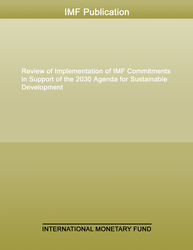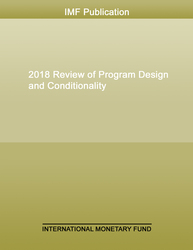
Review Of Charges And The Surcharge Policy— A Possible Reform Package
Review Of Charges And The Surcharge Policy— A Possible Reform Package
READ MORE...
Volume/Issue:
Volume 2024
Issue 045
Publication date: October 2024
ISBN: 9798400290510
$5.00
Add to Cart by clicking price of the language and format you'd like to purchase
Available Languages and Formats
| English |
Prices in red indicate formats that are not yet available but are forthcoming.
Topics covered in this book
This title contains information about the following subjects.
Click on a subject if you would like to see other titles with the same subjects.
Economics- Macroeconomics , Money and Monetary Policy , Advance repurchases , Credit , Income , Global , General Resources Account , Charges , Margin for the basic rate of charge , Surcharges , Commitment Fees , Precautionary Balances , Income
Also of interest
Summary
On October 11, 2024, the IMF’s Executive Board concluded the Review of Charges and the Surcharge Policy. The review is part of a broader ongoing effort to ensure that the IMF’s lending policies remain fit for purpose to meet the evolving needs of the membership. Charges and surcharges are important elements of the IMF’s cooperative lending and risk-management framework, where all members contribute and all can benefit from support when needed. Together, they cover lending intermediation expenses, help accumulate reserves to protect against financial risks, and provide incentives for prudent and temporary borrowing. This provides a strong financial foundation that allows the IMF to extend vital balance of payments support on affordable terms to member countries when they need it most.
Against the backdrop of a challenging economic environment and high global interest rates, the Executive Board reached consensus on a comprehensive package of reforms that substantially reduces the cost of borrowing for members while safeguarding the IMF's financial capacity to support countries in need. The approved measures will lower IMF borrowing costs by about US$1.2 billion annually or reduce payments on the margin of the rate of charge as well as surcharges on average by 36 percent. The number of countries subject to surcharges in fiscal year 2026 is expected to fall from 20 to 13.
Key reforms include a reduction in the margin for the rate of charge, an increase in the threshold for level-based surcharges, a reduction in rate for time-based surcharges, an alignment of thresholds for commitment fees with annual and cumulative access limits for GRA lending facilities, and institution of regular reviews of surcharges.
The series of three papers informed the Executive Board’s first and second informal engagements (July and September 2024) and the formal meeting (October 2024) on this review.
Against the backdrop of a challenging economic environment and high global interest rates, the Executive Board reached consensus on a comprehensive package of reforms that substantially reduces the cost of borrowing for members while safeguarding the IMF's financial capacity to support countries in need. The approved measures will lower IMF borrowing costs by about US$1.2 billion annually or reduce payments on the margin of the rate of charge as well as surcharges on average by 36 percent. The number of countries subject to surcharges in fiscal year 2026 is expected to fall from 20 to 13.
Key reforms include a reduction in the margin for the rate of charge, an increase in the threshold for level-based surcharges, a reduction in rate for time-based surcharges, an alignment of thresholds for commitment fees with annual and cumulative access limits for GRA lending facilities, and institution of regular reviews of surcharges.
The series of three papers informed the Executive Board’s first and second informal engagements (July and September 2024) and the formal meeting (October 2024) on this review.
Copyright © 2010 - 2026
Powered by:
AIDC



